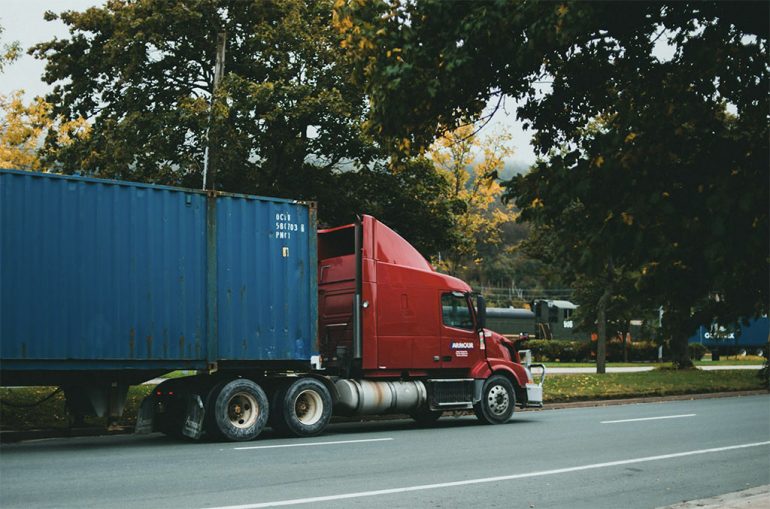Automotive

Raw materials, canned food, industrial equipment, clothes, or household items – dry van trucks carry over 40% of all transported goods in the US yearly. Here, we’ll have a quick overview of the specific features, main pros and cons of the dry van trucking method.
What Is Dry Van Trucking?
To understand what is dry van trucking, remember those huge vehicles you often see traveling from state to state. These trucks are equipped with a big, rectangular container and may slightly vary in size. While having no ventilation or climate control system inside their containers, such trucks are designed to secure goods from rain, snow, dust, and damage.
Dry van truck is an excellent choice to transport many items. Yet, most commonly it’s used to deliver:
- Paper products (books, office paper, disposable cups, etc.);
- Textile (clothes, blankets, seat covers, and airbags);
- Packed foods (cans, bottled drinks, packed rice, tea);
- Furniture (wooden or plastic wardrobes, beds, chairs);
- Electronics (smartphones, microwaves, industrial machines);
- Household items (plates, baskets, and organizers).
Is Dry Van Trucking Right for Your Shipment?
Dry van truck is not for everything – products shall have certain features, so they can be transported without a risk of waste or spoilage. So, check again, what dry van trucking offers:
- No climate control: The transported goods shall not change their quality due to cold or hot temperatures.
- Weather-proof container: While cargo is not protected from freezing in winters and heat in summers, the trucked products are reliably secured from winds, dust, rain, and snow.
- Low spends: Dry van trucking is a cheap type of transportation that helps you to minimize freight and fuel costs.
- Wide applicability: This transportation method is widely applicable across industries.
Dry Van vs. Reefer Trucking: Key Differences Explained
Reefer trucking is the second popular transportation method. While both types of trucks look very similar, they have important differences you should know.
-
- Temperature Control
Reefer trucks are always equipped with a classic refrigerator and – more rarely – with a complex climate control system. Dry van trucks have no refrigerating equipment and are not ventilated.
- Type of Cargo
While both types of trucks are widely used within industries, reefer trucks are commonly chosen for frozen and fresh meat, fruit, berries, dairy, medications, and other temperature-sensitive goods. Dry van trucks, in contrast, can carry almost everything that can be resistant to temperature changes.
- Temperature Control
Dry van trucks are cheap, while reefer-trucking costs 20-50% more, depending on the type of climate control equipment and other vehicle characteristics.
Benefits of Dry Van Trucking
Dry van trucking is widely used by many industries, as this transportation method has a lot of important advantages:
- Reliable protection: While dry van truck containers have a simple design, they are good enough to protect cargo from dirt and damage. So the transported goods arrive clean and safe.
- Low transportation price: Dry van transportation is the most cost-effective transportation method.
- Universality: The range of the goods that dry van trucks carry annually is simply impressive.
- Ease of loading: Rear-door access turns loading into a much easier process.
- Availability: Most transportation companies offer this type of transportation, making it easy to be found anytime and anywhere.
Characteristics of Dry Van Trailers
Dry van trucks come in different sizes. Smaller ones are 28 feet long, while the length of bigger trucks reaches up to 53 feet. Width is typically 8-8.5 feet. The variety of sizes helps to adjust transport services to the needs of different companies, from big manufacturers to small retailers.
What Influences the Cost of Dry Van Shipping?
Shipment costs may differ due to many factors, like:
- Distance of transportation;
- Weight of cargo;
- Type of load;
- Season (more expensive during holidays and bad weather);
- Additional equipment and services (e.g., real-time trucking).
So you can calculate costs using the freight shipping calculator.
Conclusion
Dry van trucking is the most common transportation method that is widely used all over the world. Transporting thousands of types of goods, dry van trucks, however, can not be used to carry temperature-sensitive cargo. In all other cases, a dry van truck is an excellent choice as it helps to cut transportation costs and protects goods from dirt and damage.
FOLLOW US TODAY:

Automotive Addicts Contributors are a collective of guest writers, industry professionals, and passionate enthusiasts who bring fresh perspectives to the Automotive Addicts platform. Focused on delivering timely news, in-depth reviews, and unique insights, these contributors help keep the site dynamic and engaging. Many use the platform to expand their reach and build credibility within the automotive media world, adding depth and variety to the content that drives the Automotive Addicts community.

